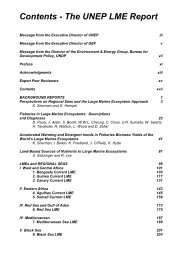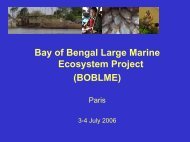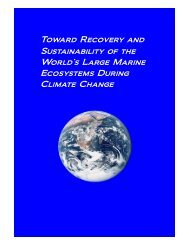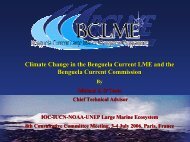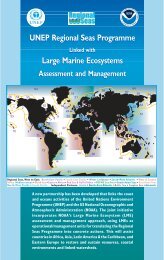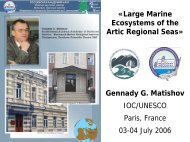Sustaining the World's Large Marine Ecosystems
Sustaining the World's Large Marine Ecosystems
Sustaining the World's Large Marine Ecosystems
Create successful ePaper yourself
Turn your PDF publications into a flip-book with our unique Google optimized e-Paper software.
already happened. Moreover, most fish and crustacean culture requires large<br />
amounts of fish protein and fish oil that comes from species which in many parts<br />
of <strong>the</strong> world and particularly in China and R. Korea, are consumed by humans.<br />
Millions (m etric tons)<br />
70<br />
60<br />
50<br />
40<br />
30<br />
20<br />
10<br />
0<br />
1986<br />
1987<br />
Aquaculture Producion<br />
1988<br />
1989<br />
1990<br />
1991<br />
1992<br />
1993<br />
1994<br />
1995<br />
1996<br />
1997<br />
1998<br />
1999<br />
2000<br />
2001<br />
2002<br />
2003<br />
2004<br />
Figure 2. Aquaculture production (fresh, salt and brackish water culture) since 1986<br />
(millions of tonnes).<br />
The YSLME project is using a novel approach in environmental management.<br />
We realise that every management decision and all human activities have an<br />
impact on more than one sector of <strong>the</strong> marine environment. We, <strong>the</strong>refore,<br />
decided to use <strong>the</strong> idea of ecosystem carrying capacity (ECC) as defined as <strong>the</strong><br />
sum of <strong>the</strong> ecosystem services (provisioning, regulating, supporting and cultural)<br />
that benefit mankind. This helps conceptualise <strong>the</strong> idea that all ecosystem<br />
services are linked and interdependent. Consequently, ecosystem based<br />
management is <strong>the</strong> only logical method for managing <strong>the</strong> environment, as<br />
traditional sector-based approaches cannot manage <strong>the</strong>se inter-linkages inferred<br />
in ecosystem carrying capacity. For example, reducing fishing effort by 25-30%<br />
will not necessarily result in <strong>the</strong> recovery of fish stocks. We also need to manage<br />
<strong>the</strong> o<strong>the</strong>r impacts on <strong>the</strong> ECC. Hence, <strong>the</strong> YSLME SAP also sets targets for<br />
reducing pollution, improving sustainability of mariculture, and controlling habitat<br />
loss as <strong>the</strong>se all affect fisheries production.<br />
Current Capture Fisheries Activities.<br />
The SAP proposed a target of a 25-30 % reduction of fishing effort to be<br />
achieved through: <strong>the</strong> control of boat numbers with 25-30% of <strong>the</strong> fishing fleets<br />
being decommissioned by 2020; <strong>the</strong> stopping of fishing in certain areas and<br />
seasons, to protect vulnerable stocks or life stages of certain species; and<br />
Global<br />
China<br />
Korea<br />
91



